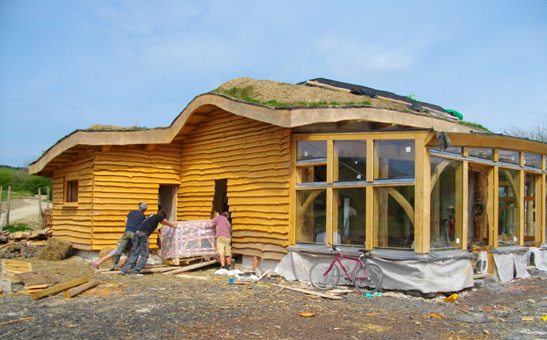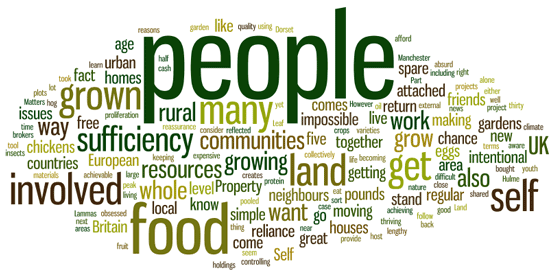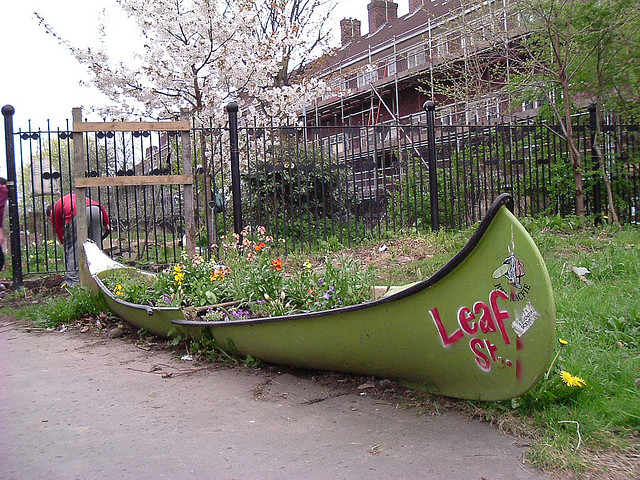Self sufficiency is back in the news, and for all of the right reasons, people want to grow and provide their own food so they know where its come from. Part of knowing where its come from is the reassurance that it is grown in the correct manner. People want food that is locally grown, free of chemicals, and contributes to the well being of both the area and the people involved and is free from any external controlling influence of business and profit dictating how its grown and what is grown in terms of specific varieties of a certain fruit or vegetable.
Self sufficiency through growing our own food is a perfect way of addressing a whole host of social issues, on top of our concerns about where our food comes from and how it’s grown. It provides food security in an uncertain age, it creates a climate where people can learn new skills, swap stuff, produce together, carry out satisfying and meaningful work, and generally get to know the people you live next door to on a whole new level.
However, becoming self sufficient in the UK is an impossible dream for many. There are few who can afford to go the whole hog and buy themselves a five acre smallholding with all the livestock and tools materials needed to sustain themselves, unless that is, you have half a million pounds to spare, which the vast majority of people don’t have.
In many European countries people are moving away from their rural communities leaving farms and small holdings so that they work and live in Cities, yet in Britain a return to a more simple and sustainable life comes with an expensive ‘Lifestyle’ tag attached to it.
 I’m sure that Property brokers and estate agents in the UK are aware to the fact that there are many people who want to return to living some sort of simple rural existence, and this is reflected in the inflated prices of smallholdings and houses with land attached, but there are some people who have moved to these less Property obsessed European countries where a level of self reliance is achievable and a lot more affordable than it is here in Britain, but even this out of reach for many people who don’t have thirty thousand pounds to spare.
I’m sure that Property brokers and estate agents in the UK are aware to the fact that there are many people who want to return to living some sort of simple rural existence, and this is reflected in the inflated prices of smallholdings and houses with land attached, but there are some people who have moved to these less Property obsessed European countries where a level of self reliance is achievable and a lot more affordable than it is here in Britain, but even this out of reach for many people who don’t have thirty thousand pounds to spare.
There is a growing group of intentional rural eco communities here in the UK who are moving towards self sufficiency such as Lammas in Pembrokeshire in Wales, Tinkers bubble in Dorset and Land Matters in Devon where people have pooled their cash and resources and bought land collectively, this would seem like an easier way of making the move but getting planning permission for these types of projects can be either be very lengthy and difficult or impossible in some cases, and again, many people do not the money to get involved in intentional communities of this nature.
Urban self sufficiency and its proliferation is one of the most pressing issues of our time if we are to actively address peak oil growing food shortages, we can only stand a chance of achieving this if we work together, if we choose to go it alone and follow the absurd and selfish path of individualism, we will perish.
Within an urban setting, a row of five Council houses with gardens could grow a large and diverse variety of food and other resources that could be shared out between neighbours. Those without gardens could be allocated allotment plots that they share with their friends, families and neighbours. Keeping chicken for eggs is also a great way of ensuring that you, your family and friends have regular access to good quality protein, there are also great ecological benefits to k eeping chickens, including a regular supply of manure, and the fact that chickens will eat the grubs and eggs of the insects that feed on your crops.
We should also consider using any vacant land that is near to our homes to grow food and other resources on. Even in the most built up urban areas there will be some land close by that isn’t being used for anything, and if we get a few local people in the area get involved, and we get the youth involved it will stand a chance of surviving and thriving, as is the case with the Leaf Street community project in Hulme in Manchester where local residents took over the land outside their homes and turned it into a fertile permaculture garden.
The most important tool for our self reliance is getting people involved and making them feel valuable and wanted, this is a powerful thing in an age where people are treated like usable commodities.


